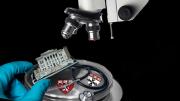At parties
Before going out, says Judith Wurtman, eat a handful (about 150 calories) of low-fat carbohydrates—dry cereal, pretzels, a slice of bread—without any protein. “Within 20 or 30 minutes, your brain is making serotonin, which will decrease your response to stress and anxiety, and turn off your appetite.”
- If a tray is passed, notice what’s on it before popping a bite into your mouth. Be mindful of what you are eating.
- If you start to eat from boredom (or nervousness), leave the party!
For buffet-style meals, adds Barbara Boothby, walk through first without a plate, so you can then go back and select what’s most appealing, instead of carelessly picking portions of this and that.
- Use a small plate, and don’t stand talking near the buffet table; select something you’ll enjoy eating and then go to another room.
Everywhere else
(Adapted from Barbara Boothby and the University Health Services website)
- Eat breakfast: People who do think better and faster, remember more, and are mentally sharper than breakfast skippers. (From Elizabeth Somer, Food and Mood, 2nd ed.)
- Drink plenty of water: Getting dehydrated can increase fatigue.
- Avoid caffeine after noon: It can stay in your system for up to 15 hours.
- Eat plenty of fruits, vegetables, and whole grains: These provide B vitamins and the natural antioxidants necessary to aid and protect neurotransmitters.
- Include foods high in choline: Wheat germ, egg yolks, peanuts and peanut butter, potatoes, tomatoes, whole wheat bread, milk, oranges, and cauliflower, for example, all boost production of acetylcholine, the neurotransmitter important for memory.
- Include essential fats, especially omega 3s: About half of the brain is fat. Omega-3 fatty acids are needed to transport nutrients into brain cells, and help regulate the chemicals that influence brain function.
- Combine quality carbohydrates with protein and/or fat in a healthy balance: Over-consuming or restricting any of these can trigger imbalances in one’s levels of neurotransmitters (chemicals controlling communication between nerve cells), which can impact mood and thinking. This also helps stabilize blood-sugar levels.
- Have protein-rich snacks: Raisins, peanuts, and cheese, for example, enhance production of the neurotransmitters dopamine and norepinephrine, which improve mood, alertness, the ability to cope with stress, and mental functioning.
- Keep healthy snacks on hand: Enjoy an alphabet’s worth—almonds, bananas, cashews, dried fruit, fig bars, graham crackers, hard-boiled eggs, hummus, instant oatmeal, low-fat cheese, oranges, peanut butter, pumpkin seeds, soy nuts, trail mix, whole grain crackers or pita, yogurt.









